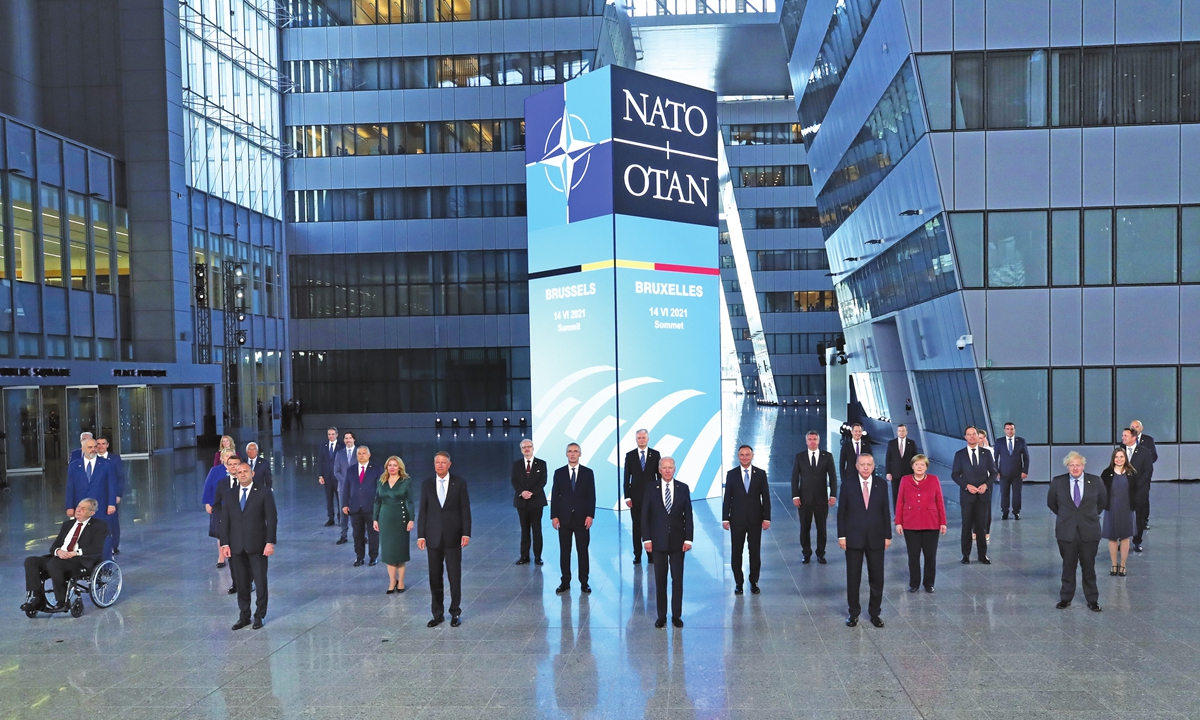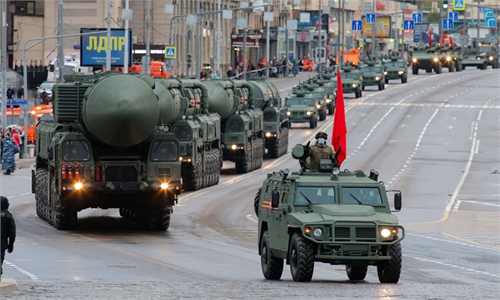
NATO leaders pose for a group photo during a NATO summit in Brussels on Monday. US President Joe Biden is taking part in his first NATO summit, where the 30-nation alliance hopes to reaffirm its unity and discuss increasingly tense relations with China and Russia, as the organization pulls its troops out after 18 years in Afghanistan. Photo: AP
US President Joe Biden will continue his anti-China roadshows among US' allies at the key summits during his ongoing European tour including the upcoming US-EU summit, said Chinese experts after a communiqué from the NATO summit issued on Monday described China as presenting "systemic challenges." It also came after the Group of Seven (G7) summit was held in the UK, in which multiple China-related issues like Xinjiang, Hong Kong, Taiwan and COVID-19 origin issues were found in the joint communiqué.
Chinese experts warned that the NATO summit on Monday will serve as a wind vane of how the US-led NATO will adjust under the core task of suppressing China and Russia, while in the bigger picture within the EU, the divergences between the US and EU countries are unlikely to be mended.
The NATO Summit Communiqué issued on Monday noted that China's growing influence and international policies can present challenges that NATO needs to address together. It also listed a number of challenges it believed China has presented including accusing China of expanding its nuclear arsenal, being opaque in its publicly declared military-civil fusion strategy and cooperating militarily with Russia.
Also, the communiqué said that NATO will "continue to work closely together to address all the threats and challenges posed by Russia."
While French President Emmanuel Macron said on Sunday that the G7 is not a club that is hostile to China, the spokesperson of China's Embassy in the UK on Monday slammed the G7 communiqué for distorting facts, and intentionally smearing China. "What the world has seen at this summit is the practice of clique politics, power politics, and the artificial creation of confrontation and division," said the spokesperson.
The confrontation seems set to continue on the larger stage of the first NATO meeting since Biden took office. NATO Secretary General Jens Stoltenberg said in an interview with Canadian public network CBC on Sunday that during the summit, they will strengthen policy on an "increasingly aggressive" China.
In an interview with US network CNBC on Sunday, Stoltenberg said NATO will continue to build its military capabilities and employ a wide combination of different tools against "Russian aggression," following Russian President Vladimir Putin's comments on Saturday that the US-Russian ties "has deteriorated to its lowest point in recent years."
Li Haidong, a professor at the Institute of International Relations of the China Foreign Affairs University, told the Global Times on Monday that the series of summits has fully shown the US' pseudo multilateralism which actually aims to counter China and Russia.
The recent uproar about the "China threat" suggests that in the coming years, NATO will adjust its functions and mechanisms around "suppressing China," said Li, noting that the so-called challenge of China and Russia will be incorporated into NATO's new strategic concept that is refreshed about once a decade.
Since the end of the Cold War, NATO launched strategic concept twice, once in 1999 and again in 2010, to guide its future development.
Lü Xiang, a research fellow in US studies at the Chinese Academy of Social Sciences in Beijing, told the Global Times on Monday that the G7 summit has shown signs of a decline in the US' control over its allies, so it has to use any platform available as a stage for anti-China rhetoric, like the NATO summit.
NATO head Stoltenberg's comments cannot represent the voice of Europe, but the voice of the US, an old-fashioned anti-China rhetoric, Lü said.
EU countries, different from the US-led G7 and NATO, have their own interests in China, and they want to have an independent position, which is difficult to reconcile with the interests of the US, Lü said, noting the future will only see them increasingly conflicted.
Before Biden's European tour, Danish state broadcaster DR dropped a bombshell that the US National Security Agency used a partnership with Denmark's foreign intelligence unit to spy on senior officials of neighboring countries, including German leader Angela Merkel, Reuters reported.
As Biden meets with European leaders, questions continue over the US' opposition to the Nord Stream 2 project, a gas pipeline that would deliver 55 billion cubic meters of Russian gas to Europe every year, Bloomberg said.
The project is a guarantee for Germany's energy security, while for the US, it represents Germany's break from energy dependence on the US, which hopes to sell large quantities of shale gas to Europe, experts said. "This divergence is fundamentally one between economic and security interests," Lü said.
As for the Biden-Putin meeting on Wednesday, experts see it as a major effort to ease tensions, but it is not a real improvement in relations. "The two countries are likely to draw a red line that will prevent relations between the two nuclear-armed powers from spinning out of control," Li said.
The US finds it alone is unable to compete with China and Russia on the world stage from the position of strength, which is why it keeps drawing in European allies and pushing out China and Russia, Li said.
"Europe is observing Washington from the same angle with China - its intention and capacity, which is weaker than it used to be," Lü said.
In the past four years, Europe has seen repeated swings and uncertainty in US policy. "People are wondering what's going to happen in the US next year, what's going to happen in the elections three years from now, and whether there's going to be a bigger constitutional crisis than in 2020," Lü said.


